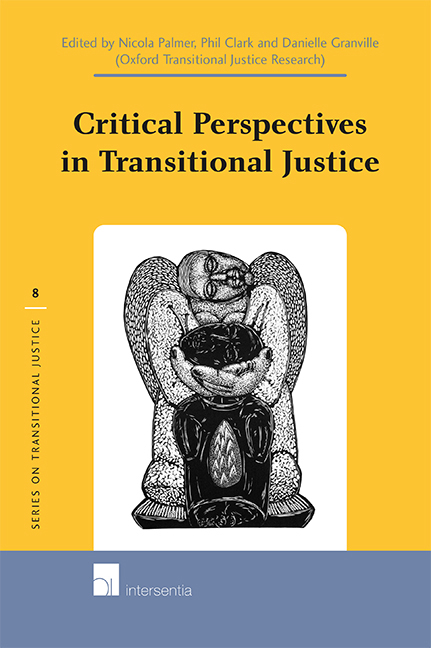Book contents
- Frontmatter
- Note
- Acknowledgements
- Contents
- Abbreviations
- Introduction
- Section 1 Critiquing Core Concepts in Transitional Justice
- Section 2 Accountability, Human Rights and the Rule of Law
- Section 3 Locality and Legitimacy
- Section 4 Memory, Ritual and Apology
- Section 5 Transitional Justice After Transition
- Contributors’ Biographies
- Series on Transitional Justice
24 - Post-Conflict Accountability and the Demands of Justice: Can Conditional Amnesties Take the Place of Criminal Prosecutions?
Published online by Cambridge University Press: 22 December 2020
- Frontmatter
- Note
- Acknowledgements
- Contents
- Abbreviations
- Introduction
- Section 1 Critiquing Core Concepts in Transitional Justice
- Section 2 Accountability, Human Rights and the Rule of Law
- Section 3 Locality and Legitimacy
- Section 4 Memory, Ritual and Apology
- Section 5 Transitional Justice After Transition
- Contributors’ Biographies
- Series on Transitional Justice
Summary
INTRODUCTION
When justice campaigners formulate aims and expectations for post-conflict justice, criminal prosecutions of the persons responsible for human rights violations and for politically motivated crimes are often given pride of place. Criminal trials in the aftermath of violent conflict and political suppression are intended to hold individuals accountable for the injuries they inflicted on others. And often enough, trials do succeed in this ambition, at least in respect of the (often comparatively few) accused brought before the courts. There is by now a wealth of evidence that the political context of such trials notwithstanding, accused persons can be treated fairly, evidence can be found reliably, victims and witnesses can be treated with respect and punishment can send a meaningful message about the reprehensibility of the conduct of the accused. Trials and convictions also serve as markers of the accused person's responsibility for his past conduct, confirming his culpable agency.
The quest for post-conflict accountability is also rooted in a concern for democratic consolidation. Generally speaking, it is feared that, unless successor regimes make credible attempts to bring to justice those responsible for past atrocities (or at the very least those responsible for the policy decisions that led to their organised commission by lower-level perpetrators), the resulting legitimacy deficit will undermine respect for the rule of law and the political authority of the newly created (or reformed) democratic institutions, sometimes with fatal consequences for longer-term stability. Although the empirical evidence supporting these assumptions is inconclusive, worries of this kind provide a strong impetus for the ongoing international campaign against impunity. These efforts include calls on peace negotiators, supra-national institutions and third states to block, to the extent possible, attempts by affected states to allow the perpetrators of past atrocities to be shielded from prosecution and punishment by national amnesty laws. There is also considerable support for the view that domestic amnesties for international crimes constitute evidence of unwillingness on the part of the amnesty-granting state to prosecute those protected by these laws, triggering the prosecutorial competence of the ICC under the complementarity rule. Moreover, there is sometimes good reason to be suspicious of the good faith of some who mobilise against the political legitimacy of trials and advocate or even demand alternatives to them. It is not rare for such calls to originate from persons who have most to gain from leniency, and/or from their political friends.
- Type
- Chapter
- Information
- Critical Perspectives in Transitional Justice , pp. 459 - 484Publisher: IntersentiaPrint publication year: 2012



